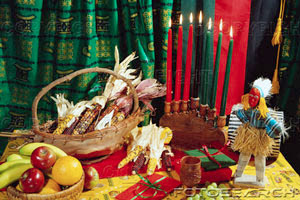
Kwanzaa, a cultural holiday celebrating African-American heritage, is a seven-day celebration that begins Dec. 26 and ends Jan. 1. It was developed in the wake of the Watts Riots in 1966 by activist and California State University professor Maulana Ron Karenga as a way to emphasize black culture and pride. The New York Times has estimated that 13 million people celebrate Kwanzaa each year. The United States Post Office has commemorated it with a stamp, and Hallmark and other companies have tailored cards for it.
But what started as an intentionally non-religious holiday is taking on a religious hue as more churches - Roman Catholic and Protestant, traditionally African-American and mixed raced - have adopted the holiday. That has sparked debate within some Christian communities that Kwanzaa, with its secular emphasis, has no place in church. At the same time, more public schools have begun to include Kwanzaa in December celebrations and lessons, angering parents who complain that it is unfair to include Kwanzaa while "watering down" the religious meanings of Christmas and Hannukah. The official Kwanzaa website, however, maintains that Kwanzaa is a "cultural choice" distinct from religious observance.
Who celebrates Kwanzaa and why? Does it belong in the public school curriculum? How true has Kwanzaa remained to its original principle of black pride? What role does it play in churches?
The relationship of Christianity to other faiths is often most pronounced in December. Kwanzaa complicates this by relating to African-American culture, which many schools seeks to celebrate, while also increasingly relating to religion, which schools often play down.
Aucun commentaire:
Enregistrer un commentaire